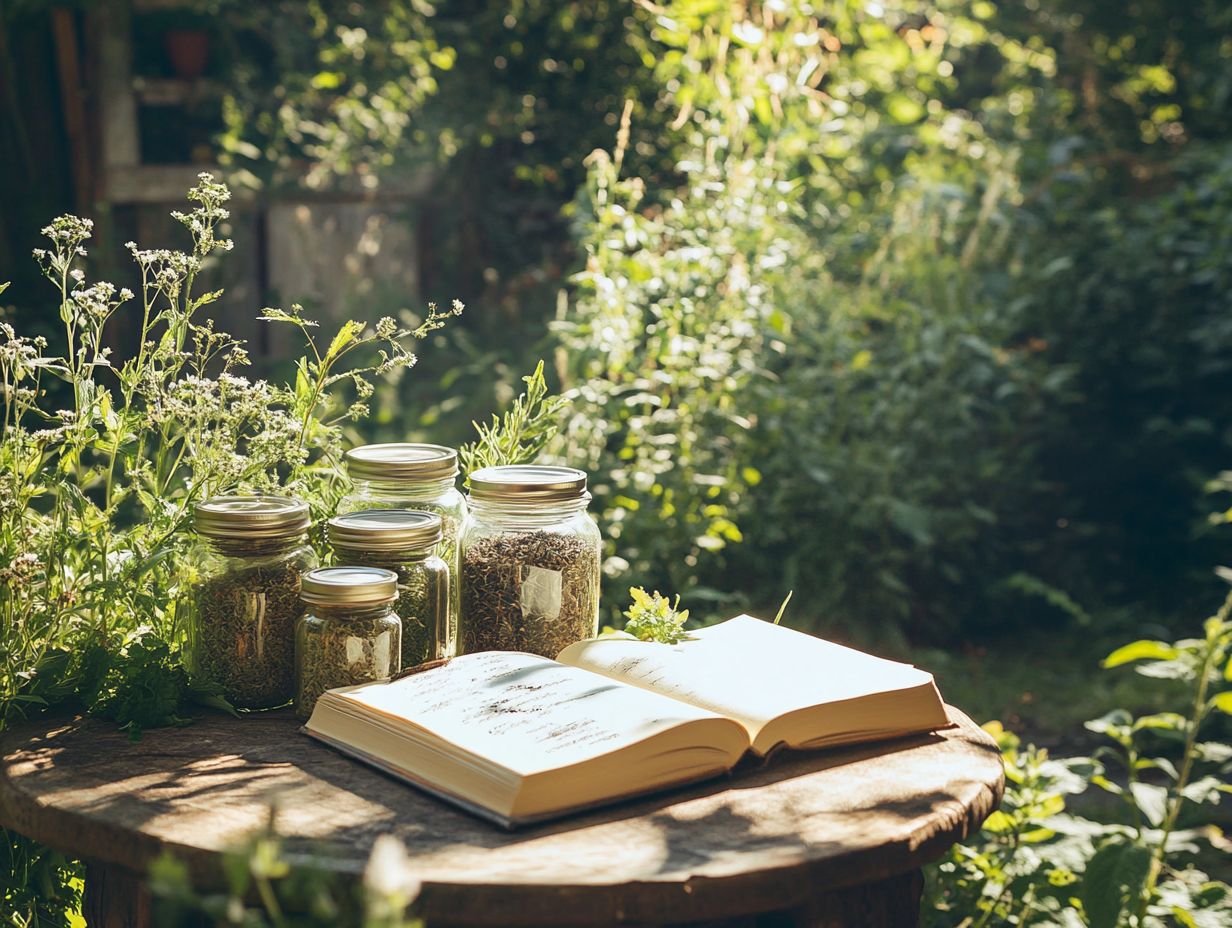The Importance of Safety in Herbal Medicine
Herbal medicine has surged in popularity as individuals increasingly seek natural alternatives for their health and wellness needs, particularly in the context of herbal remedies and traditional practices.
It’s essential to grasp the fundamentals of herbal medicine safety, including potential risks, safety concerns, and the regulations that govern its use.
This article delves into the essence of herbal medicine, outlines safety guidelines, and reviews current regulations while exploring alternative approaches to ensure safe practices in herbal therapy.
By the end, you ll feel confident navigating the exciting world of herbal remedies!
Contents
- Key Takeaways:
- The Basics of Herbal Medicine
- The Safety Concerns with Herbal Medicine
- Potential Risks and Side Effects
- Ensuring Safety in Herbal Medicine
- Guidelines for Safe Use
- The Role of Regulation in Herbal Medicine
- Current Regulations and their Effectiveness
- Alternative Approaches to Herbal Medicine Safety
- Frequently Asked Questions
- What is the importance of safety in herbal medicine?
- How can I ensure safety when using herbal medicine?
- Are there any specific safety concerns with herbal medicine?
- Can herbal medicine be harmful?
- Why is it important to purchase herbal products from reputable sources?
- What steps can I take to use herbal medicine safely?
Key Takeaways:

- Herbal medicine can provide many health benefits, but understand potential risks and side effects before use.
- Follow guidelines for safe use and consider consulting with a trained herbalist to help ensure safety.
- Current regulations for herbal medicine may not be sufficient, so educate yourself and take necessary precautions when using herbal remedies.
The Basics of Herbal Medicine
Herbal medicine encompasses a vast array of traditional practices and natural therapies that harness the power of plants, roots, and extracts for healing. This approach is deeply embedded in communities worldwide, where herbal remedies have served as alternatives for centuries, addressing numerous health challenges.
By emphasizing holistic well-being, herbal medicine combines ancient wisdom with modern health practices. Therefore, it s crucial for individuals and health professionals to understand both its benefits and potential risks.
Defining Herbal Medicine
Herbal medicine uses plants for healing and is a cornerstone of complementary and alternative medicine.
This ancient practice embraces natural substances like leaves, roots, flowers, and seeds, each with its own set of medicinal properties. Advocates of herbal remedies believe these natural ingredients contain chemicals that may help health and facilitate healing, often focusing on a holistic approach to treatment.
Unlike conventional medicine, which relies heavily on synthetic drugs and targeted interventions, herbal options strive to address the root causes of health challenges while promoting overall well-being. This fundamental difference highlights the vital role of herbal products in nurturing long-term health and supporting the body’s natural healing capabilities.
The Safety Concerns with Herbal Medicine
The safety concerns surrounding herbal medicine are crucial, especially as the popularity of these products continues to grow in both developed and developing countries. While many individuals seek herbal remedies for their perceived natural benefits, it s essential to recognize the potential risks, toxic compounds, and the need for safety monitoring in certain preparations.
As a health-conscious individual, know these important safety issues! Health professionals should actively monitor safety, educate the public about the risks associated with self-medication using herbal remedies, and understand the importance of creating herbal remedies: safety tips for responsible herbal medicine use.
Potential Risks and Side Effects

The potential risks and side effects of herbal medicines can be quite significant. These range from mild allergic reactions to severe tests that assess the safety of substances that can lead to serious adverse health outcomes.
Take echinacea, for example. While it s popularly used to help boost the immune system, it can provoke allergic reactions in those who are sensitive to plants in the daisy family. This highlights the need for risk awareness.
The potent herb kava has also been associated with liver toxicity, raising red flags about its safety. This prompts calls for regulation, effective monitoring, and public health considerations.
These examples highlight the critical need to ensure efficacy alongside safety when exploring herbal therapies. It’s essential for both practitioners and users to remain vigilant regarding potential adverse reactions.
Understand the safety monitoring practices that can be implemented. Take action now to mitigate any risks, ensuring that the benefits of herbal remedies don t overshadow their potential dangers and adverse reactions.
Ensuring Safety in Herbal Medicine
Ensuring safety in herbal medicine requires adherence to established guidelines for safe use. These guidelines are essential for both health professionals and consumers alike, considering the ongoing public interest in herbal consumption.
By implementing effective monitoring practices and boosting consumer awareness about potential adverse reactions, you can significantly mitigate the risks associated with herbal therapy.
This proactive approach enhances the safe consumption of herbal medicines and contributes to improved overall health outcomes.
Guidelines for Safe Use
Guidelines for the safe use of herbal medicines are crucial in ensuring you are well-informed about the quality control and efficacy of herbal components.
- Recognizing reputable sources
- Understanding dosage recommendations
- Discerning appropriate herbal interactions with other medicinal products
Quality control measures, such as third-party testing and certification, are essential for verifying that herbal products meet safety, quality control, and potency standards.
Health education enables you to make informed choices by teaching you how to identify potential side effects and contraindications. It also emphasizes the significance of consulting healthcare professionals before incorporating herbal remedies into your wellness routine.
By prioritizing safety and knowledge, you can confidently navigate the complex landscape of herbal medicine.
The Role of Regulation in Herbal Medicine
The role of regulation in herbal medicine is essential for ensuring that herbal products adhere to safety and efficacy standards. This ultimately safeguards public health and enhances awareness regarding herbal medicine.
Regulatory authorities bear the responsibility of establishing comprehensive guidelines, issuing licenses for herbal products, and implementing robust pharmacovigilance systems systems for monitoring the safety of medicines after they have been approved to monitor the safety and effectiveness of these herbal medicines.
By doing so, they play a pivotal role in maintaining the integrity of herbal medicine in the marketplace.
Current Regulations and their Effectiveness

Current regulations surrounding herbal medicines vary significantly across regions and countries. This impacts their availability and usage patterns.
These differences are often influenced by cultural attitudes toward natural remedies, the level of scientific research in each jurisdiction, and the demand from consumers for these herbal products.
For instance, some areas may impose stringent guidelines that prioritize safety and efficacy, requiring rigorous testing and certification, while others might take a more relaxed approach.
This diverse landscape creates a complex environment for you as a health professional. Stay informed and navigate these regulations confidently to provide informed advice regarding traditional herbal medicinal products.
Consumers, too, may find themselves bewildered by the varying quality and legality of herbal products available to them.
Alternative Approaches to Herbal Medicine Safety
Alternative approaches to ensuring safety in herbal medicine include effective monitoring practices, strong efforts to inform consumers, and detailed health education programs. By implementing these strategies, you can promote informed usage patterns and significantly minimize the risks associated with herbal therapies.
This proactive stance enhances safety and enables you to make well-informed decisions regarding your health and wellness.
Other Methods for Ensuring Safety
Other methods for ensuring safety in herbal medicine involve enhancing health professionals’ awareness and educating consumers about the risks tied to self-medication.
Fostering open communication between patients and healthcare providers is essential. By discussing any potential herbal remedies you are considering, health professionals can offer tailored guidance based on your unique health conditions and existing medications, including important herbal medicine dosage and interaction awareness.
Standardizing quality control measures or steps taken to ensure products are safe and reliable in the production of herbal products is crucial. This approach minimizes contamination risks and product variability, ensuring that what you use is both safe and effective.
Join workshops and explore resources to empower your understanding of possible interactions and side effects, enabling you to make informed decisions while relying on expert advice!
Frequently Asked Questions
What is the importance of safety in herbal medicine?

The importance of safety in herbal medicine lies in the potential risks and side effects. These risks can occur if herbs are not used properly.
How can I ensure safety when using herbal medicine?
To ensure safety when using herbal medicine, consult with a qualified healthcare professional before starting any herbal treatment. They can provide guidance on proper dosage, potential interactions, and any precautions that should be taken based on your individual health and medical history.
Are there any specific safety concerns with herbal medicine?
While herbal medicine is generally safe, there are specific safety concerns to be aware of. These include potential interactions with prescription medications and allergies to certain herbs.
Can herbal medicine be harmful?
Absolutely! Herbal medicine can pose dangers if misused. Some herbs can cause side effects or interact with medications, while others may be toxic in high doses.
Why is it important to purchase herbal products from reputable sources?
It is important to purchase herbal products from reputable sources to ensure their safety. Reputable companies conduct quality control tests and provide accurate information on their products, reducing the risk of contamination or mislabeling.
What steps can I take to use herbal medicine safely?
To use herbal medicine safely, do your research and consult with a healthcare professional. Always purchase from reputable sources and be aware of potential interactions and side effects.
Follow recommended dosages and discontinue use if any adverse reactions occur. Consult a healthcare professional before starting any herbal treatment to protect your health!





